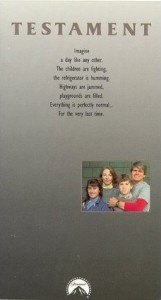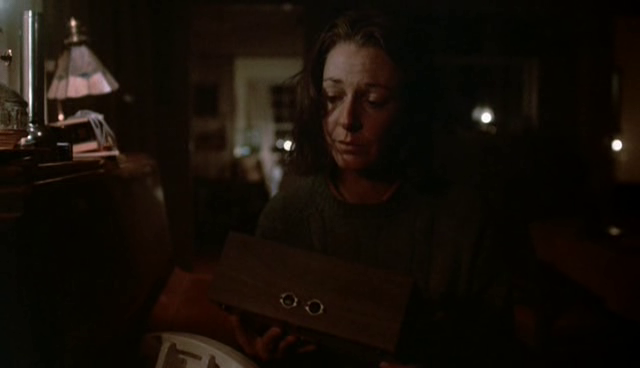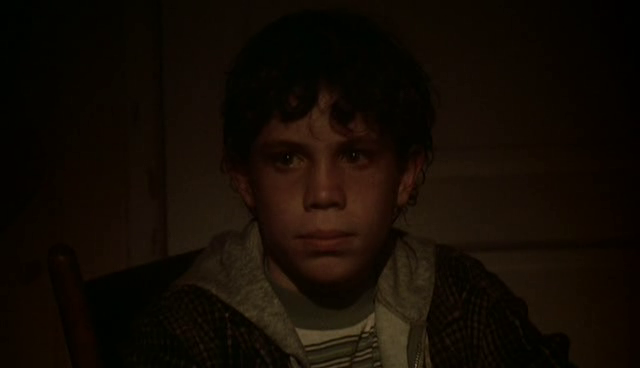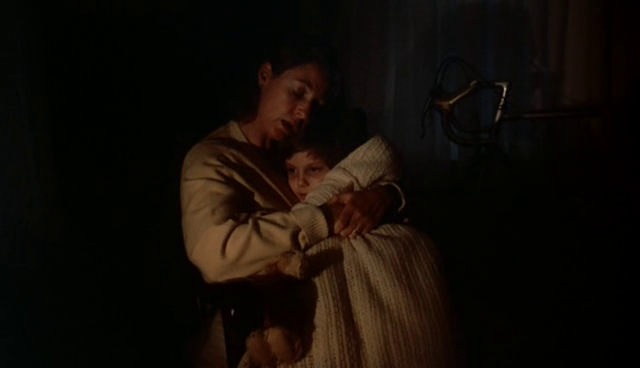Testament (1983)
“Tell it to stop.”
|
Synopsis: |
|
Genres, Themes, Actors, and Directors: Response to Peary’s Review: What’s most impressive (and effective) about Testament is its quiet authenticity. As the film opens, rather than presenting an idyllic, pastoral representation of life in small-town America, we see a typically hectic morning in the Wetherly household, with Alexander frantically trying to get her kids ready to leave for school, and Harris feeling slightly put-upon by his over-eager dad, who insists on challenging him to a rigorous, semi-competitive bike ride early each morning; meanwhile, Alexander and Devane quibble (she pours dry cereal over his head in frustration when he refuses to take time for breakfast), but they make up with one another later that night in a way that demonstrates the ultimate solidity of their marriage. The time Littman takes to show us all of these seemingly mundane details results in an even more powerful sense of shock and loss when “there is a flash in the sky from [a] bomb” — a moment that “should give every viewer a sick feeling in the stomach”, given that “a nuclear explosion cannot be reversed”. Community relations are quickly strained, and we see the effect on more than just Alexander’s family. Kevin Costner and Rebecca De Mornay, for instance, play a young couple whose newborn quickly becomes a casualty of the blast; meanwhile, a Japanese-American gas station owner (Mako) with a mentally retarded son (Gerry Murillo) suddenly finds himself in an unexpected position of power, given his access to valuable fuel. Other than a few such contextualizing scenes, however (including the casual arrival of a neighborhood boy whose parents have disappeared, and who comes to live with Alexander’s family), the story remains heavily focused on Alexander’s attempts to help her own family survive. To that end, viewers have debated the ultimate wisdom of her character’s choice to simply stay put in her house, waiting for what seems like the inevitable, painful death of herself and her loved ones; many wonder why she doesn’t attempt to flee with her family to a different, less exposed location (which is what Costner and De Mornay’s characters do). Yet I find her decision eminently logical and realistic; in the face of ultimate powerlessness, it makes sense to stay in a comfortable and “known” location, and the film is no less potent or revealing because of this pivotal narrative choice. Redeeming Qualities and Moments:
Must See? Categories Links: |





One thought on “Testament (1983)”
A once-must, for the story and for Alexander’s performance.
Going in, the viewer is likely to know this is a film about a nuclear attack – and about the unimaginable becoming reality. So the film’s early, ‘typical day’ sequences will perhaps carry extra weight, since you know what’s coming.
Though it doesn’t have to be a nuclear attack, the unimaginable can, of course, happen. This film reminded me of the day before 9/11. I was in Central Park with my then-partner. I remember thinking it was a particularly gorgeous day: we had made a point of enjoying the perfect weather by being in the park, relaxing, reading. Tons of people around us apparently had the same idea.
The very last thing any of us could have dreamed was the nightmare that arrived the next morning. Those who survive that kind of incident can have a kind of out-of-body experience. You don’t really think you’re in your own skin but your spirit hovers around you cause you’re still here.
That’s what this movie details for you. So it’s rather a mood piece – and the mood of the last 20 minutes, in particular, holds nothing back.